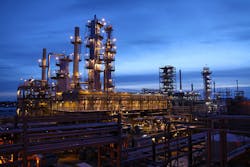Calumet considers renewable diesel project for Montana refinery
Calumet Specialty Products Partners LP is evaluating the potential reconfiguration of an existing hydrocracker to enable production of renewable diesel at subsidiary Calumet Montana Refining LLC’s 30,000-b/d refinery in Great Falls, Mont.
Noting that hydrocracker conversions are typically faster to market, less expensive, and less technically challenging than construction of a greenfield unit, Calumet said it estimates the “oversized hydrocracker” at Great Falls can be reconfigured to process 10,000-12,000 b/d of renewable feedstock into diesel at the lowest capital cost per barrel of any currently proposed industry project of this type.
“We believe Great Falls, which connects western agriculture with [US] West Coast and Canadian clean product markets, presents one of the most compelling opportunities for renewable diesel production in North America,” the operator said.
The potential project, which would be funded by third-party equity given strong investor interest in renewables, also could allow the refinery to retain ongoing processing of 10,000-12,000 b/d of low-cost Canadian crudes, according to Calumet.
Calumet added the 18,000-b/d mild hydrocracker at Great Falls in 2016 as part of an expansion project that more than doubled the refinery’s crude oil processing capacity (OGJ Online, Feb. 19, 2016).
While the operator disclosed no additional details regarding a timeframe for or cost of the planned renewables project, Calumet did confirm future dual-train operations at Great Falls could generate an estimated $220-260 million of adjusted EBITDA assuming mid-cycle market prices as well as the existing regulatory environmental structure, which includes renewable identification number (RIN) purchase obligations under the Renewable Fuels Standard (RFS), low carbon fuel standard (LCFS) program incentives, and the federal biomass-based diesel blender's tax credit (BTC).
The proposed renewable diesel reconfiguration at Great Falls follows Calumet’s previous evaluation of potentially divesting the refinery during 2020 as part of the operator’s strategy to reduce its required capital commitments and expenditures, according to the company’s 2019 annual report published in March 2020.
The Great Falls refinery currently processes western Canadian heavy and light sour crudes it receives through the Front Range pipeline system via the Bow River pipeline to produce gasoline, diesel, jet fuel, naphtha, and asphalt for sale mostly to local markets in Montana, Idaho, and Canada, Calumet said.
Calumet’s announcement follows a series of planned renewable projects currently in development by US operators as part of business strategies increasingly aimed at ensuring long-term operational competitiveness by reducing costs of compliance with federal and state low-carbon fuel regulations (OGJ, Oct. 5, 2020, p. 38).
About the Author
Robert Brelsford
Downstream Editor
Robert Brelsford joined Oil & Gas Journal in October 2013 as downstream technology editor after 8 years as a crude oil price and news reporter on spot crude transactions at the US Gulf Coast, West Coast, Canadian, and Latin American markets. He holds a BA (2000) in English from Rice University and an MS (2003) in education and social policy from Northwestern University.

